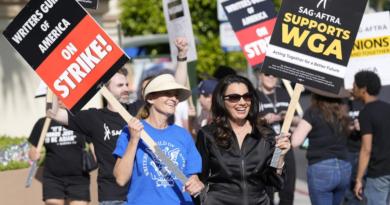Not only will Uber and Lyft pay $328 million to settle a wage theft suit, they are establishing a New York minimum wage and paid sick leave
Uber and Lyft will pay drivers in New York a combined $328 million to settle wage theft claims and have agreed to establish a minimum wage and paid sick leave for drivers across the state, Attorney General Letitia James announced Thursday.
The settlements resolve allegations that the popular riding-hailing companies improperly charged drivers sales taxes and other fees when those costs should have been paid by customers.
Uber will pay $290 million and Lyft will pay $38 million, with the money distributed to current and former drivers, James said. The companies have also agreed to provide drivers outside of New York City with paid sick leave and a minimum wage of $26 per hour.
“Rideshare drivers work at all hours of the day and night to take people wherever they need to go,” James said in a statement. “For years, Uber and Lyft systemically cheated their drivers out of hundreds of millions of dollars in pay and benefits while they worked long hours in challenging conditions.”
In a separate announcement, New York Gov. Kathy Hochul said Uber has agreed to begin making quarterly payments to the state’s unemployment trust fund and will make a retroactive payment into the fund to cover dues it owed since 2013. The fund pays for benefits for unemployed workers.
State and federal laws block the disclosure of how much Uber will contribute to the fund, the governor’s office said.
Uber and Lyft have become ubiquitous in New York, with the easy to use ride-hailing apps largely supplanting the city’s iconic yellow taxi cabs. As they have taken over, the companies have been slow to adjust to labor regulations and have balked at providing drivers basic labor protections and benefits.
New York was the first city in the country to establish a minimum wage for the app-based drivers, who are effectively independent contractors able to set their own hours. The city has also implemented a minimum wage for app-based food delivery services such as Uber Eats.
“We’ve waited eight long years to see justice for our members, a workforce that was cheated out of better living conditions, and timely meals and rest and leisure because the earnings that would have provided for that life were stolen by multi-billion dollar corporations,” said Bhairavi Desai, head of the New York Taxi Workers Alliance, which brought the wage theft complaints to the state.
Tony West, chief legal officer for Uber, said the agreement “helps put to rest the classification issue in New York and moves us forward with a model that reflects the way people are increasingly choosing to work.”
Lyft’s chief policy officer, Jeremy Bird, said in a statement, “This is a win for drivers, and one we are proud to have achieved with the New York Attorney General’s Office.”
In California, a court this year ruled that ride-hailing and delivery companies like Uber and Lyft can continue to treat their California drivers as independent contractors, meaning they are not entitled to benefits like paid sick leave and unemployment insurance.



